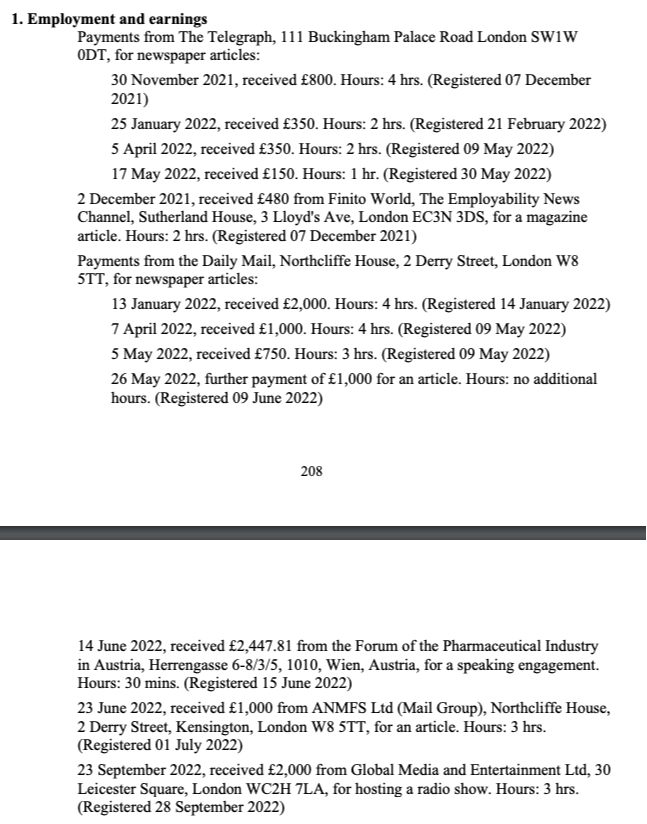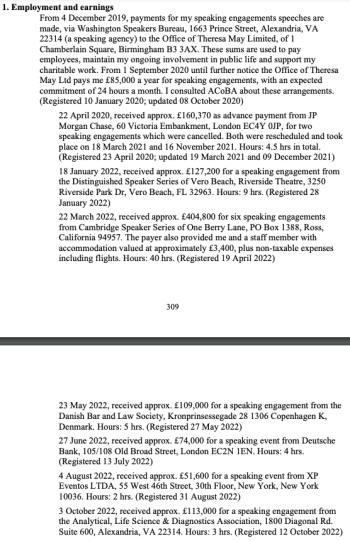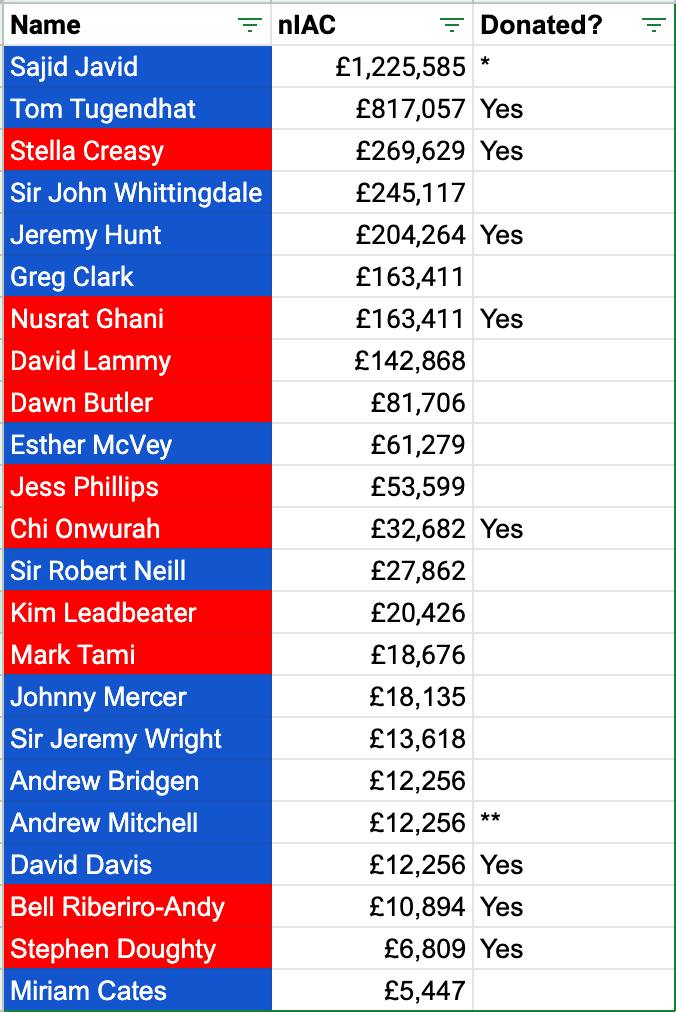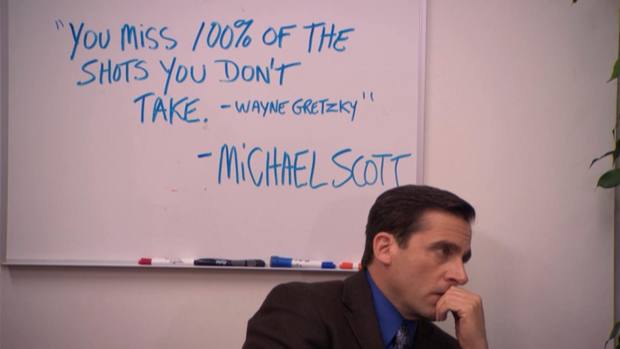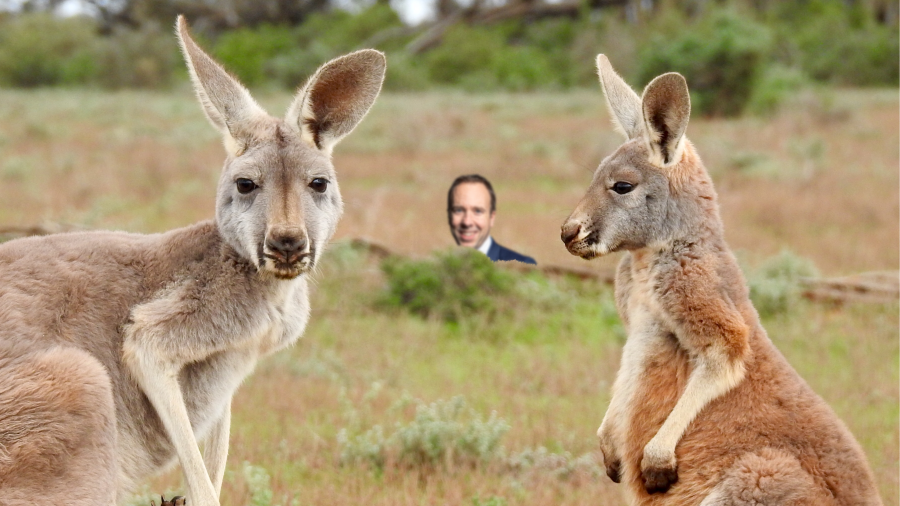
Former health secretary Matt Hancock will soon appear on jungle-based reality TV show I’m A Celebrity… Get Me Out of Here!, which is a fact you may have already emotionally comes to terms with.
More disturbingly, The Sun (which first broke news of the crypto-loving backbencher’s plans) has reported that he will be paid £400,000 for the appearance, “sparking fury among his critics”.
Part I: How much money is £400,000?
As the worldʼs leading global business publication we feel qualified to certify that £400,000 is a lot. An IAC season runs for three weeks. UK MPs receive a basic salary of £84,144 and benefit from frequent parliamentary recesses. Let’s assume Hancock is at work 52 weeks a year. (He is not.) Staying until the final would mean he’ll be banking about eighty times his basic MP salary, pro rata, or substantially more if he gets voted out early.
According to a Sun infographic in the link above, the fee puts Hancock comfortably in the top ten of IAC earners. He’s about £50k ahead of “media personality” Katie Price and neck-a-neck with football pundit Ian Wright and Olympic boxer Amir Khan.
Note that those figures are not inflation-adjusted. Wrighty (2019) and Khan (2017) would be getting £458.7k and £488.7k respectively, assuming ITV tracks ONS total pay growth, or £479k/£459.2k based on CPI (which we’re inclined to favour here).
Here’s how inflation adjustment leaves the top ten (NB Price reportedly ceded part of her fee after leaving the 2009 series early):
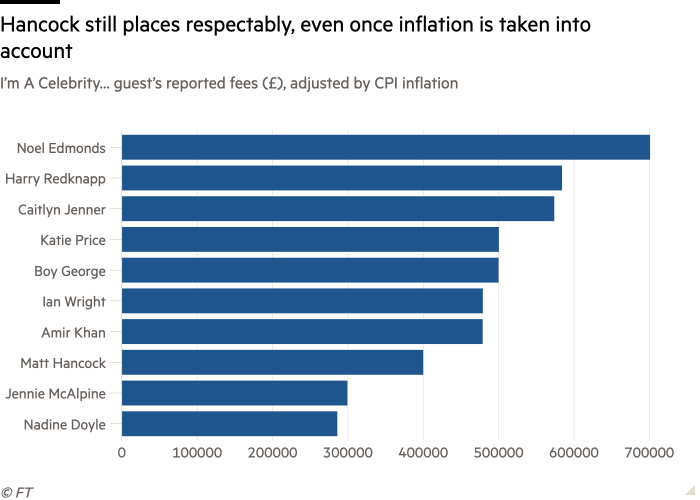
Still a decent showing for the man formerly in charge of Britain’s health services. It’s not a like-for-like comparison, however, because Hancock’s participation is partial. Here’s the dek from the Guardian’s review of the first episode:
We are all waiting to see Hancock eat a kangaroo penis — but the failed health secretary hasn’t even turned up yet, leaving us with a bunch of people we’ve barely heard of.
And from IAC paper-of-record The Sun:
Hancock could miss out on doing Bushtucker Trials after suffering from a secret health condition. . . . We can reveal that Matt got trench foot while filming Celebrity SAS Who Dares Wins and it might not have cleared up.
Part II: The Tragedy of the Commons
Naturally, many MPs — elected as public servants — will be look at Hancock’s IAC appearance with disgust.
“It’s plain wrong,” some might think. “Why can’t I get that much money?”
Nerdy Alphaville readers [Ed: tautology] had similar questions:
hurrah!! https://t.co/ytUjbodVnF
— General Boles (@GeneralBoles) November 3, 2022
Naturally, we were interested. Weekends are typically spent watching people fight on Twitter but everyone over there’s especially angry at the moment, for some reason, so instead we opened a spreadsheet alongside the register of MPs’ interests and got to work.
The figure we’re seeking is nIAC — an MP’s nominal fee for an I’m A Celebrity appearance. And since Hancock is not the first MP to appear on the show, there should be a rich seam of data available.
Should, but isn’t. As far as we can see, a fee was never revealed or even purported for former Liberal Democrat MP Lembit Öpik, who anyway entered the jungle after losing his seat. There’s a similar post-HoC issue with Edwina Currie, Robert Kilroy-Silk, and Kezia Dugdale (h/t the i paper for putting together a list).
A perhaps more relevant entrant is Nadine Dorries, the MP and novelist who was, until earlier this year, the secretary of state for Digital, Culture, Media and Sport. Reports suggested Dorries was paid £40,000 her IAC appearance in 2012; she denied this.
Dorries also apologised to the Commons for failing to declare her appearance fee, claiming the money went through her media company, Averbrook Limited. The Guardian reported:
Dorries has now asked to register that Averbrook had an income of around £142,000, a profit of £82,000, and paid a £10,000 dividend to her at the end of October.
This overall lack of transparency left us with a simple choice: Hancock or bust.
Part III: Hancock’s half-hour
MPs are well remunerated by national standards, though maybe not by industry standards (according to the argument that paying more would recruit a higher quality of politician). Either way, any champion of democracy who is unhappy with their lot can augment their pay in a variety of ways. It’s the kind of thing that often causes controversy and can occasionally, eventually, bring down a government.
Since resigning as health secretary for the simple crime of choosing love, Hancock has feathered his nest in a number of ways:
What we need is an earning activity benchmark that can be compared with an appearance on IAC. Pay rates for articles don’t count, as there is no habeas corpus element to submitting an op-ed.
Two potential choices jumped out:
14 June 2022, received £2,447.81 from the Forum of the Pharmaceutical Industry in Austria, Herrengasse 6-8/3/5, 1010, Wien, Austria, for a speaking engagement. Hours: 30 mins.
… and:
23 September 2022, received £2,000 from Global Media and Entertainment Ltd, 30 Leicester Square, London WC2H 7LA, for hosting a radio show. Hours: 3 hrs.
FTAV’s Qualitative Analysis Committee has concluded that the former is more relevant. Here’s its reasoning: there’s no way it was enjoyable.
The sum quoted would suggest Hancock’s one-hour going rate for an unpleasant overseas job is £4,895.62 (we’re assuming the weird number is to do with exchange rates). By extrapolating this figure we can generate a ratio.
How much larger is the fee for up to three weeks of IAC versus the price for an hour of international speech time? In this case, the answer is 87.1 times larger. That’s the Hancock Ratio.
Part IV: Memberwang
Wielding our Hancock Ratio and crude rationale, we set to work. At this point, a few important caveats:
— Capacity for shame is undoubtedly a factor of the HR, so it’s significant that Hancock is probably (though not certainly) past the peak of his political career. Some of the MPs here may have more hope and, therefore, self-respect.
— The terms of Hancock’s disengagement as health secretary (and, we suppose, his management role in the UK’s Covid-19 response) mean he already has a degree of celebrity that might have inflated his fee.
— It’s hard to know (partially for the reasons above) whether the HR will show the amount an MP could reasonably demand, or how much the show’s creators would be willing to pay them. The buy-sell spread on their dignity represents an inestimable complication.
— There might be a reason to treat fees for international appearances differently, but we’re going to assume the burden of travel is priced in.
— Most MPs have not recently been paid for speeches, so this is going to be a select list.
Ok, let’s do it.
IV.1: The World King
The elephant in any room, Britain’s once(-and-future?) PM has long been a star attraction on the after-dinner circuit. Moreover, Boris Johnson’s earning power appears to have taken it up another notch since leaving Number 10.
As The Telegraph reported last month:
Johnson was paid more than double his prime ministerial salary for a $350,000 (approximately £316,041) speech and “fireside chat” in the United States earlier this week.
Mr Johnson took part in the sit-down interview at the Council of Insurance Agents and Brokers conference in Colorado on Tuesday.
The piece’s headline refers to a “30-minute speech”, although the article doesn’t say how long he spoke for. We’re going to take the Telegraph as an informed source on Johnson’s demands and assume he can pull roughly £632,082 an hour for international speaking engagements.
Applying the HR, this would indicate Johnson could command a fee of £51.6mn to appear on I’m A Celebrity. We don’t have to tell you that this is a nonsensically large amount of money. It’s nearly a whole Garden Bridge.
IV.2: Speak if you May
Since her disastrous spell as Prime Minister, Theresa May has done quite well for herself by speaking at foreign companies (who presumably weren’t paying much attention to how she did in Number 10):
Using the latest entry — £113,000 for a three-hour speaking engagement at the Analytical, Life Science & Diagnostics Association — we can calculate that May’s hourly rate as £37,666.67.
Applying HR, this gives as an nIAC of just over £3mn. This feels quite realistic? May probably isn’t five times as famous as Noel Edmonds, but the premium seems reasonable for a 66-year-old ex-PM.
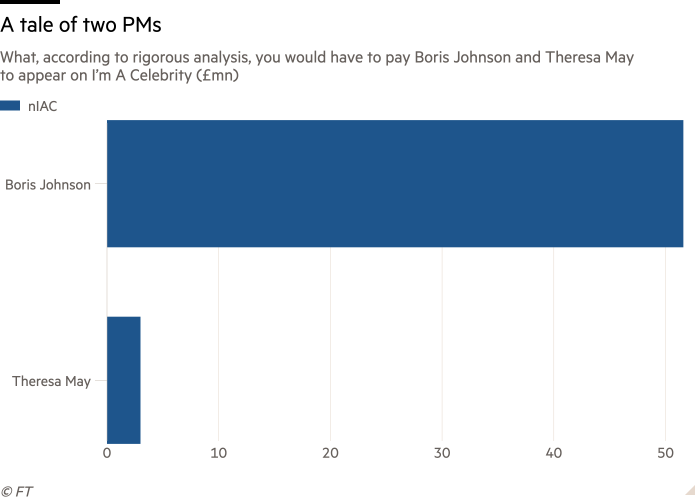
4.3: …and the rest
Here in broad terms is the same formula applied to those MPs who had “speech”, “speaking” or “appearance” listed in the most recent register of members’ interests (massive caveats to follow). The ‘Donated’ column indicates whether the money earned was given to charity:
Caveats (specific)
* This figure is based on Sajid Javid’s last speech before he began to handle such arrangements through SJ Office Ltd. Javid is an unpaid director of SJ Office and his declaration says, “These sums are used to pay employees, maintain my ongoing involvement in public life and support my charitable work.”
** This was a literary festival appearance so book sales may be included in Andrew Mitchell’s total earnings.
Caveats (general)
-
Many MPs do speeches for which they just get their expenses covered but are not paid
-
As much as Alphaville supports charitable giving, we are not sure if the MPs who donated speaking fees would think about the relative value of an IAC appearance in the same way
-
In general we’ve tried to prioritise recency. Exceptions were made in cases where the MP charges markedly different amounts for different audiences, such as for multinational banks versus schools (cf. Stella Creasy)
-
We’d assume Jeremy Hunt could earn more now that he’s Chancellor of the Exchequer.
-
Data journalism doesn’t get any easier.
-
Alphaville was tempted to crunch the numbers again based on media appearances but life is short, unlike this article.
Allowing for all that, a couple of other quirks caught our eye — including that Sarah Olney (Lib Dem) and Tom Tugendhat (Cons) also both (separately) accepted a case of wine in exchange for speeches.
We assume this negotiation went down less like:
Event Person: “Come to my event.”
MP: “No.”
EP: “I’ll give you wine.”
MP: “Ok then.”
And more like:
EP: “Nice speech, have some wine.”
MP: “Thanks. [In soliloquy] Great, now I have to declare this wine.”
Anyway, since you asked, Tugendhat accepted £165 worth of wine/hour of speech. Olney accepted £150wphs.
In both instances, assuming a standard case of 12x750ml bottles, that suggests they would go on I’m A Celebrity in exchange for 735 litres of wine — roughly five full bathtubs, or 0.3pc of an Olympic swimming pool’s capacity (per the most cursory Google ever). Tugendhat’s wine baths would be more expensive.
In conclusion
We’ve learned incredibly little from this exercise and so, reader, have you.
There might be some statistical validity to the Theresa May estimate, given a few parallels with Hancock, so if she does end up in next year’s IAC Alphaville would happily take a finders’ fee. As for the rest:
